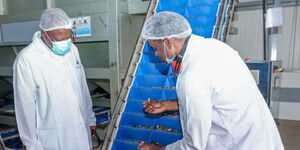Shrewd fruit vendors have devised a new scheme to swindle unwary Kenyans, mostly targeting avocado and banana lovers.
Buyers in Murang’a County raised alarm on how traders were dipping avocados in a black chemical to dupe their customers that the fruits were ripe.
To convince the buyers who raised questions on the hardened skins, the traders allegedly argued that the fruits were ripe from inside.
“I reached home and as usual, I always wash fruits and groceries bought from the market. I was stunned at realising that the avocado was painted black.
“They stole from me. I could not believe I fell for the trick,” one buyer lamented.
“I was a victim too,” Ciku Saimah complained.
In a Facebook post where the trick was flagged, more Kenyans spoke about the fraud which they argued had infiltrated many markets in the region.
“Murang’a traders are so tricky and quick-thinkers,” Mwalimu Paul Ngojo wrote.
Frederick Njagi stated that he regularly passes by the markets and was always been attracted to by the mouth-watering avocados, only to realise they were unripe.
The traders were reported to be operating under shades, while others sold by the roadside and on the highways. However, the buyers did not divulge how the traders sold the avocados during the rainy season.
They, however, believed that the avocados were painted a day earlier, put under the sun to dry before being ferried to the market.
Other buyers, however, differed with those who were deceived and defended the traders.
“At the point where we are as a country, one indeed needs to be clever. The avocado will ripen after a week, thus I wonder why we are crying foul,” Janne Kihara argued.
“I cannot comprehend why someone has to cry. Let us praise the marketer who convinced the buyer to purchase the avocado because of the colour rather than it being ripe. The seller needs a reward at the expense of the buyer who lacks experience,” Pauline Waweru added.
“You must be clever, especially with Kenya’s current high living standards. How will you pay school fees? However, this is too much,” one Easy Gatheru weighed in.
Sigwesi Lucia Mburu advised all to desist from roadside shopping which she termed as the biggest racket ever. “Rotten tomatoes are packaged in such a way you cannot see until you get home. Rotten arrowroots are dipped in mud to dupe you.”
In both the past and recent years, more such cases have been in the limelight, with some touching on bananas, yoghurt, samosas, sausages and fried chicken.
In May 2021, motorists plying the Nairobi - Nakuru Highway lamented about purchasing toxic yoghurts sold on by the roadside.
"When you arrive at Gilgil weighbridge, buy three yoghurts from these roadside hawkers and give one yoghurt back to the hawker to partake as you watch. Even if you give them Ksh1,000 as a bonus, they will not drink the yoghurt," one buyer stated at the time.
Traders countrywide have also been accused of using a chemical - ethylene - an agent that fastens the ripening and maturation of bananas.
“To distinguish between artificially ripened fruits and naturally ripened, pay attention to colour. For instance, bananas which are ripened naturally are dark yellow and there are mostly small brown/black spots here and there on the bananas with the stalks being black,” a food nutritionist advised.
The Kenya Bureau of Standards (KEBS) has heightened its crackdown on conniving traders in recent years.












